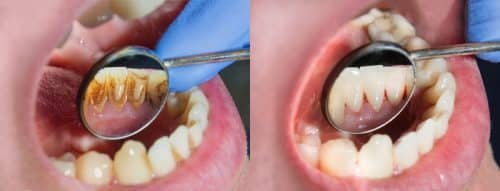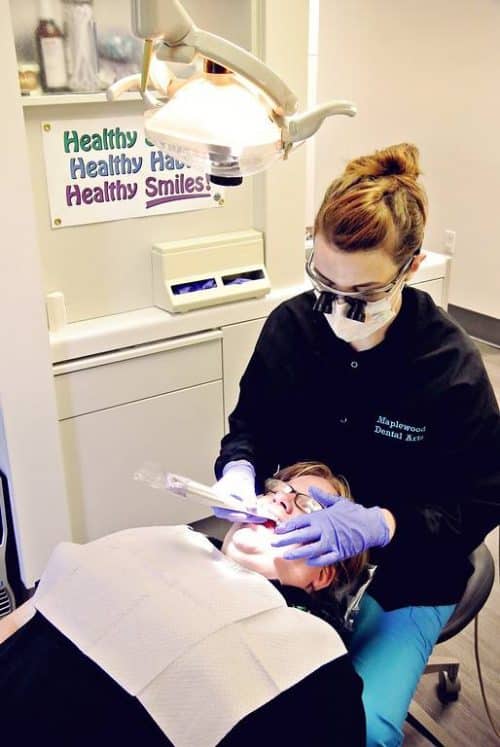Posted by: Maplewood Dental Arts in Uncategorized
What is Periodontal Disease and What Does It Have to Do With Me?
Periodontal disease is an infection of the gum tissue and bone, which are the supporting structures of teeth, that can compromise the way we use our mouths. If left untreated, it can wreak permanent havoc on gums, teeth, and even spread to tissues throughout the rest of our bodies. Many people do not realize the systemic connection a healthy mouth and gums and a healthy body overall.

Dental plaque is the sticky stuff that develops on our teeth and is one of the biggest reasons why teeth must be brushed regularly–to scrape off growing plaque. Along with molecules from the food we eat plaque harbors bacteria, which settles below the gumline and can cause infection in the pockets between your gums and teeth.
How Do You Get Periodontal Disease?
Ironically, it is actually our bodies’ reaction to the plaque growth that starts us on the path to periodontal disease. The immune system swells the tissues surrounding your teeth, the gums, the periodontal ligaments holding your teeth in place, and the alveolar bone beneath.
This inflammation is called “gingivitis”, and it remains until the plaque is properly cleaned, irritating and gradually destroying the tissues.
Gingivitis–or swollen gums is the earliest sign of periodontal disease when the infection is in its preliminary form. Many people experience mild swelling of the gums and bleeding when flossing, but did you know that these things aren’t normal?
A very healthy mouth will have gum tissue that would bleed no more than any other part of the body when cleaned. In this stage of infection, it’s important to increase the quality and frequency of oral hygiene routine to prevent bacteria from developing further.
In the late stages of the disease, the supporting structures are so impacted that there is a loss of bone, teeth become loose and susceptible to root decay and eventually tooth loss.
Genetics, certain systemic diseases, smoking habits, smokeless tobacco, drugs, and poor diet can all contribute to the development and progression of periodontal disease. Gingivitis develops into periodontal disease after long periods of lackluster oral hygiene and infrequent, or irregular dental visits.
The swelling of the gums further irritates the periodontal ligaments holding your teeth in place, which can loosen teeth in progressed stages of the infection. If left untreated, a slew of health complications could be the end result.
It is speculated that blocked arteries caused by periodontal disease can increase the risk of heart and respiratory disease, or worsen existing disease; increase risk of stroke; or make diabetes more difficult to manage by complicating blood sugar regulation.
How can I avoid periodontal disease?

The easiest way to avoid periodontal disease is good oral hygiene! However, if it is too late and you are experiencing periodontal disease, there are a few treatment paths that could be followed.
“Debridement” is a procedure that removes plaque buildup from all areas around the teeth, clearing the tissue for healing after advanced stages of infection. “Dental scaling” is a similar procedure that removes plaque buildup from the surface of the tooth, followed by “root planing”, which smooths the surfaces of the root and removes the infected tooth.
“Irrigation” is a slightly less invasive process that irrigates the periodontal area to flush away infection. Finally, as with any infection, a course of antibiotics may be part of your treatment plan. For periodontal disease, an antibiotic called ARESTIN is deployed locally rather than systemically.
Periodontal disease can be an annoyance in its earliest stages and life-altering in its latest. No matter what your symptoms, we are here to help you achieve optimal health for your teeth and gums and put you back on track for a healthy smile! Schedule an appointment at Maplewood Dental Arts in Gorham, ME today!




